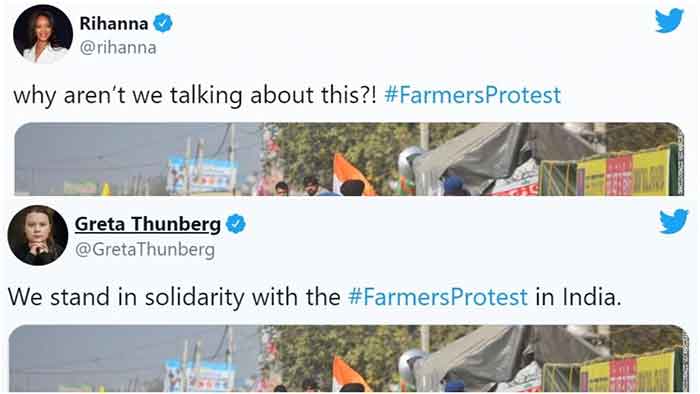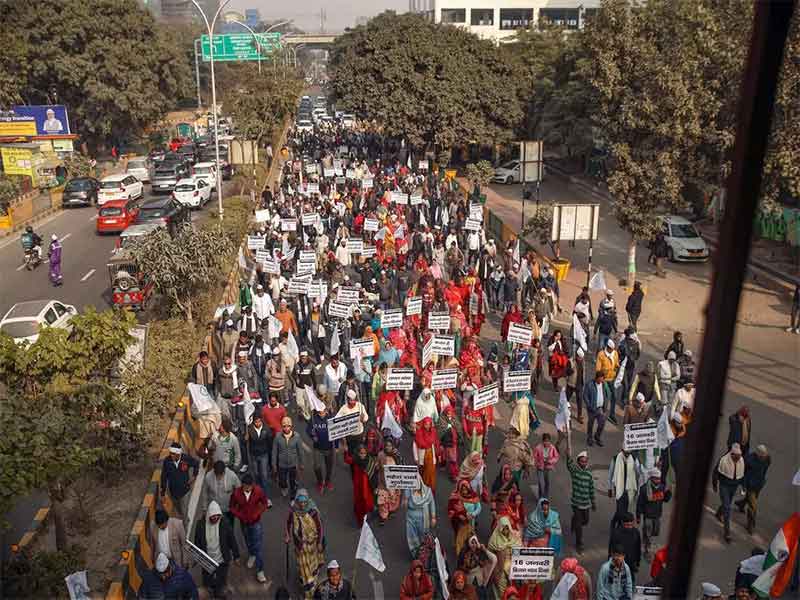
Rihanna, Susan Sarandon, Greta Thunberg, John Cusack – the list of well-known celebrities endorsing the struggle of Indian farmers against the country’s new corporate-authored farm laws is growing by the day. What started out as a domestic fight by thousands of Indian farmers to preserve their livelihood and way of life is rapidly morphing into a global cause.
And the Indian government’s ballistic response to a few foreign tweets -as if the Chinese had made a few more incursions along the country’s borders – shows there is indeed an international dimension to the entire affair.
But what exactly is moving so many around the world to take a stand on a fight over the future of agriculture in faraway India? And how could all this overseas attention play out in bringing the current standoff between farmers and the Modi regime to a conclusion?
First, about why the Indian farmers movement is attracting such a chorus of international solidarity. There are several reasons, chief among them the poignant but inspiring visuals of a nation’s food producers, including the elderly, women and children braving it out in the bitter cold for months, peacefully and patiently negotiating their demands for repeal of anti-farmer laws with an obstinate, repressive Indian regime.
The movement’s classic David versus Goliath nature is also drawing sympathies from people everywhere fed up with control of their lives by Big Corporations, Big Government, Big Media, Big Everything. The main beneficiary of the farm laws is expected to be Mukesh Ambani, India’s richest business tycoon, who has managed to rope in US$21 billion over the last year from some of the wealthiest entities on Planet Earth, including Facebook, Google, the Saudi and Abu Dhabi sovereign investment funds.
Facebook is the biggest investor in Ambani’s Jio Platforms, that owns both Jio – India’s largest mobile network and Jio Mart -which hopes to dominate the country’s fast-growing e-groceries market. The plan is for Ambani’s telecom empire to join forces with Facebook’s messaging service WhatsApp, which has over 400 million users in India, to expand Jio Mart’s consumer base.
However, another important reason why India’s farming community is gaining widespread support across national boundaries has nothing to do with economics per se. What seems to be touching the hearts of people around the world is that farmers are fighting for not just income but also for their independence.
On paper India’s new farm laws could initially benefit some farmers by giving them access to nationwide retail outlets but in the long run they are likely to go from being autonomous cultivators to coolies tied to corporate diktats. Once big corporations takeover the currently fragmented supply chain for agricultural products the highly diversified and decentralized sector will also see the rise of big monopolies.
While e-groceries companies like Jio Mart will control purchase, processing and retail of food products large agribusinesses are likely to enforce everything from choice of crops to selection of seeds, fertilizers and pesticides. Digital payment services – that include the Facebook-owned WhatsApp – will provide credit, finally reducing farmers to the status of wage earners permanently at the mercy of whimsical corporate executives and investors.
The advent of e-commerce in India over the last decade – though popular with urban consumers– has been quite bad for small businesses that lack the technology or money power to compete in any meaningful way. The growing operations of retail giants such as Amazon and Walmart, online aggregators Ola and Uber or online flight and hotel booking platforms have badly hurt the incomes of thousands of small but independent businesses, shopkeepers, taxi drivers along with service providers and commission agents.
Observing these experiences Indian farmers can obviously sense the slavery that awaits them in future if they allow the implementation of the new farm laws. Even in the developed economies the unchecked expansion of Big Tech companies such as Amazon, Google, Facebook, Apple and Uber – worth over US$5 trillion together- has raised alarm over the implications of monopoly formations for democracy itself.
“Much like the railroad tycoons and telecom barons of yesteryear, modern day tech giants have amassed tremendous market share over vital levers of commerce — search engines, app stores and social media services”, said a US Congress investigation report in early October last year[1].
These handful of firms – along with a few others like the Jack Ma-owned Ali Baba- are likely to account for a humongous 30% of the world’s gross economic output within just a decade – making them more powerful than most governments anywhere. What is worse is that this domination is self-perpetuating, with the US Congressional report pointing out there was “significant evidence” to show that Big Tech deliberately smothered competition, hindered innovation and reduced consumer choice.
If all this is happening in the United States, the globe’s biggest capitalist power, shouldn’t the Indian government also be worried about a similar takeover of its much smaller economy by these Big Tech firms? Well, that’s not the way it works in India – where for all the feigned official outrage over critics abroad the entire economic strategy for the last three decades has revolved precisely around inviting as much ‘external interference’ in the country’s ‘internal affairs’ as possible.
With a mismanaged economy, plummeting state revenues and growth hit by the Covid-19 pandemic the Modi regime is now banking even more on influx of foreign capital to lift the ‘animal spirits’ of Indian businesses. At a personal level, keeping the new laws intact is also critical for the business plans of Mukesh Ambani, who is both a close friend of the Prime Minister and chief financier of the ruling Bharatiya Janata Party.
All the big investment that came into Ambani’s Jio Platforms has already been used to pay off old debts of his flagship Reliance Industries, which was in deep trouble at the beginning of 2020[2]. If the farm laws are repealed and his foreign backers pull out Mukesh Ambani’s dubious scheme of replacing old debts with new ones may fall through.
The celebrity tweets supporting the Indian farmers is worrying for the Indian government for the possible fallout these may have on public opinion in the US and on big investors there backing Ambani’s aggressive foray into the e-groceries business.
Further, if the new Joe Biden administration takes the US Congress’ sub-committee’s report calling for regulations to reign in manipulative social media companies seriously, Ambani’s biggest partner-in-crime Mark Zuckerberg may come under greater scrutiny for both his domestic and global operations. Facebook is already tainted among US Democrats for its involvement in the Cambridge Analytica scandal that helped power Donald Trump (incidentally, a buddy of Narendra Modi) to victory in the 2016 Presidential elections[3].
At this stage high profile global campaigners and activists need to continue putting pressure on not just the Indian government itself but also companies like Facebook, Google and others to stop investing in the crony capitalist empire of Mukesh Ambani.
While ultimately it is the spirit and spread of the Indian farmers movement that will decide whether they win or not, given the deep involvement of US companies with the problem, more support from the American public could certainly help tip the balance.
Satya Sagar is a journalist who can be reached at [email protected]
[1] https://judiciary.house.gov/uploadedfiles/competition_in_digital_markets.pdf?utm_campaign=4493-519
[2] https://www.bloomberg.com/news/articles/2020-06-19/ambani-meets-zero-net-debt-goal-with-15-billion-jio-investments
[3] https://www.theguardian.com/news/2018/mar/17/cambridge-analytica-facebook-influence-us-election
IF YOU LIKED THE ARTICLE SUPPORT PEOPLE’S JOURNALISM















































